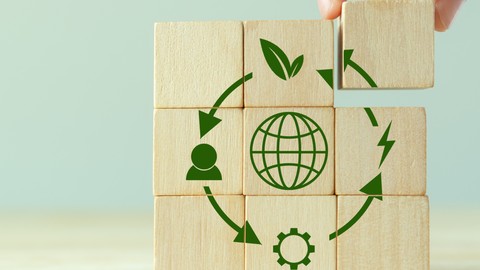
Understanding Economic Sustainability
Understanding Economic Sustainability, available at $29.99, with 15 lectures, and has 2 subscribers.
You will learn about Define sustainability and understand the connections between its three pillars: environmental, social, and economic. Analyze the economic impact on sustainability and the challenges to implementing positive change. Identify ways to foster responsible economic growth while considering environmental constraints and social equity. Learn about institutional and individual responsibilities for creating a sustainable future. This course is ideal for individuals who are Students and professionals in economics, environmental science, and social studies. or Anyone interested in learning about sustainable development and its economic impact. It is particularly useful for Students and professionals in economics, environmental science, and social studies. or Anyone interested in learning about sustainable development and its economic impact.
Enroll now: Understanding Economic Sustainability
Summary
Title: Understanding Economic Sustainability
Price: $29.99
Number of Lectures: 15
Number of Published Lectures: 15
Number of Curriculum Items: 15
Number of Published Curriculum Objects: 15
Original Price: $29.99
Quality Status: approved
Status: Live
What You Will Learn
- Define sustainability and understand the connections between its three pillars: environmental, social, and economic.
- Analyze the economic impact on sustainability and the challenges to implementing positive change.
- Identify ways to foster responsible economic growth while considering environmental constraints and social equity.
- Learn about institutional and individual responsibilities for creating a sustainable future.
Who Should Attend
- Students and professionals in economics, environmental science, and social studies.
- Anyone interested in learning about sustainable development and its economic impact.
Target Audiences
- Students and professionals in economics, environmental science, and social studies.
- Anyone interested in learning about sustainable development and its economic impact.
In today’s interconnected world, sustainability is a critical issue that affects every aspect of our lives. “Understanding Economic Sustainability: Balancing Growth and Responsibility” is a comprehensive course designed to provide students with a thorough understanding of the economic pillar of sustainability and its critical role in shaping a sustainable future.
Sustainability refers to the idea that humans must utilize Earth’s resources in ways that allow all life to co-exist and thrive, both now and in the future. The concept rests on three interdependent pillars: environmental, social, and economic. Each pillar is equally crucial, supporting and being supported by the others. This course focuses specifically on economic sustainability, examining its definition, significance, challenges, and strategies for implementation.
At the outset, you will learn about the current state of global economic health. Economic growth worldwide largely hinges on resource consumption. However, many resources, such as fossil fuels, are finite and are being used irresponsibly. Renewable resources, like trees, are consumed at rates faster than they can be replenished. This unsustainable consumption poses severe risks to both environmental and social stability. We need a balanced approach where economic prosperity, community well-being, and environmental resilience are achieved together.
Next, the course will delve into defining economic sustainability. Economic sustainability encompasses economic development, job creation, fair compensation, labor rights, and the circular economy, which promotes the reuse and regeneration of materials and products. This pillar enables society to innovate, solve problems, and improve living standards. However, it must be pursued in harmony with environmental and social goals, emphasizing responsible resource usage while minimizing negative impacts on the environment and society.
Understanding economic sustainability’s importance is another key aspect covered in this course. A diverse, positive, and inclusive work culture enhances economic sustainability, leading to growth in jobs, green technology, and infrastructure. Equitable treatment of workers, ensuring their safety, fair treatment, and living wages, also play crucial roles.
You will explore how economic sustainability impacts the other pillars of sustainability. Economic changes such as eliminating poverty, encouraging responsible resource consumption, and meeting society’s needs can significantly improve social well-being. However, as people become wealthier, their resource consumption tends to increase, leading to negative environmental impacts. Ignoring environmental sustainability risks ecosystem collapse, highlighting the need for balance.
The course addresses the challenges of economic sustainability, including social inequity, the high costs of green technology and infrastructure, poverty, responsible resource management, political instability, and climate change. These challenges prompt crucial questions: How can we enhance living standards and create economic prosperity without compromising our environment? What will drive changes in our behaviors, culture, and policies toward sustainability?
Implementing change is a multi-level effort involving individuals, corporations, and institutions. Each must consider the environmental and social impacts when implementing policies, strategies, and behavioral changes. Corporate responsibility, in particular, plays a significant role. Businesses can promote an equitable workplace by integrating diversity and inclusion initiatives and providing living wages and benefits. Investing in green technology research and development, adopting manufacturing processes using renewable energy, conserving water, and reducing waste are practical corporate steps towards economic sustainability.
By the end of this course, you will possess a nuanced understanding of economic sustainability and its broader implications. You will be better equipped with knowledge and strategies to foster sustainable economic growth in ways that respect and protect our environment and society.
Course Curriculum
Chapter 1: Introduction
Lecture 1: CONNTEXTE
Lecture 2: 02 LESSON OUTLINE
Lecture 3: 03 LEARNING OBJECTIVES
Lecture 4: 04 INTRODUCTION
Chapter 2: Economic Sustainability
Lecture 1: 05 CURRENT STATE
Lecture 2: 06 ECONOMIC SUSTAINABILITY
Lecture 3: 07 WHY IT’S IMPORTANT
Lecture 4: 08 IMPACT
Lecture 5: 09 CHALLENGES
Lecture 6: 10 CHANGE
Lecture 7: 11 CORPORATE RESPONSIBILITY
Lecture 8: 12 IMPLEMENTING CHANGE
Chapter 3: QUESTIONS
Lecture 1: 13 QUESTIONS 1
Lecture 2: 14 QUESTION 2
Chapter 4: Conclusion
Lecture 1: 15 CONCLUSION
Instructors
-
GURUCAN Institute
Expert in Training & International Consulting
Rating Distribution
- 1 stars: 0 votes
- 2 stars: 0 votes
- 3 stars: 0 votes
- 4 stars: 0 votes
- 5 stars: 0 votes
Frequently Asked Questions
How long do I have access to the course materials?
You can view and review the lecture materials indefinitely, like an on-demand channel.
Can I take my courses with me wherever I go?
Definitely! If you have an internet connection, courses on Udemy are available on any device at any time. If you don’t have an internet connection, some instructors also let their students download course lectures. That’s up to the instructor though, so make sure you get on their good side!
You may also like
- Top 10 Content Creation Courses to Learn in December 2024
- Top 10 Game Development Courses to Learn in December 2024
- Top 10 Software Testing Courses to Learn in December 2024
- Top 10 Big Data Courses to Learn in December 2024
- Top 10 Internet Of Things Courses to Learn in December 2024
- Top 10 Quantum Computing Courses to Learn in December 2024
- Top 10 Cloud Computing Courses to Learn in December 2024
- Top 10 3d Modeling Courses to Learn in December 2024
- Top 10 Mobile App Development Courses to Learn in December 2024
- Top 10 Graphic Design Courses to Learn in December 2024
- Top 10 Videography Courses to Learn in December 2024
- Top 10 Photography Courses to Learn in December 2024
- Top 10 Language Learning Courses to Learn in December 2024
- Top 10 Product Management Courses to Learn in December 2024
- Top 10 Investing Courses to Learn in December 2024
- Top 10 Personal Finance Courses to Learn in December 2024
- Top 10 Health And Wellness Courses to Learn in December 2024
- Top 10 Chatgpt And Ai Tools Courses to Learn in December 2024
- Top 10 Virtual Reality Courses to Learn in December 2024
- Top 10 Augmented Reality Courses to Learn in December 2024






















